New water efficiency label under plans to protect supplies and cut energy bills
The labels could save consumers £125 million on water bills and £147 million on energy bills over 10 years, Defra said.

Your support helps us to tell the story
From reproductive rights to climate change to Big Tech, The Independent is on the ground when the story is developing. Whether it's investigating the financials of Elon Musk's pro-Trump PAC or producing our latest documentary, 'The A Word', which shines a light on the American women fighting for reproductive rights, we know how important it is to parse out the facts from the messaging.
At such a critical moment in US history, we need reporters on the ground. Your donation allows us to keep sending journalists to speak to both sides of the story.
The Independent is trusted by Americans across the entire political spectrum. And unlike many other quality news outlets, we choose not to lock Americans out of our reporting and analysis with paywalls. We believe quality journalism should be available to everyone, paid for by those who can afford it.
Your support makes all the difference.Dishwashers, taps and washing machines could have to carry mandatory water efficiency labels under plans to protect supplies and cut energy bills.
The labels could save 1,200 million litres of water a day – the equivalent of 480 Olympic swimming pools, the Department for Environment, Food and Rural Affairs (Defra) said.
Based on 2019 prices, they could also save consumers £125 million on water bills and £147 million on energy bills over 10 years.
Water Minister Steve Double said: “Water is a precious resource. We want to support consumers so they can make savings without having to make significant changes to their daily lives.
“These plans will help people to make the right choices to save water and reduce their energy bills.”
The proposals, subject to a 12-week consultation, aim to introduce a separate water label from the existing energy label for display on toilets, urinals, kitchen sink taps, bathroom basin taps, non-electric shower outlet devices and shower assembly kits, dishwashers, washing machines and combination washer/dryers.
The Government’s proposals on water efficiency labelling are a vital step forward in reducing the amount of water we all use, and will allow customers to make informed decisions as well as save money and energy
Hot water use is the second-largest use of energy in a home after space heating.
Installing a water-efficient showerhead could save an average household 3,762 litres of water and £17.44 off their combined utility bills per year, according to Defra’s figures.
A family of four could save 6,468 litres and about £30 off their combined energy and water bill each year.
In 2021 alone, energy efficiency labelling and minimum performance standards led to energy bill savings of £75 for the average dual-fuel household.
Ofwat chief executive David Black said: “This summer has highlighted the importance of water. Water labelling is a key tool, helping everybody make informed choices that can reduce their water use and bills.
“Managing water demand plays a role in tackling the pressures on our water system, alongside pushing water companies to reduce leakage and looking at new sources and water transfers to increase our future water supply. We support the proposals and look forward to seeing the outcome of this consultation.”
Christine McGourty, the chief executive of Water UK, which represents water companies, said: “The Government’s proposals on water efficiency labelling are a vital step forward in reducing the amount of water we all use, and will allow customers to make informed decisions as well as save money and energy.
“Alongside the work that water companies are already doing to tackle leakage from pipes and invest in infrastructure, cutting water use will help make our water supply more resilient to the existential challenges of climate change.”
The consultation launch follows a commitment from the Environment Secretary last year to introduce a mandatory efficiency label as part of wider plans to safeguard water supplies.
The package includes asking water companies to develop a consistent approach on fixing customer supply pipe leakage and developing greater water efficiency in new developments and through retrofits.
The National Framework for Water Resources aims to reduce personal water consumption to 110 litres per person per day by 2050, compared with the current average of 145 litres.
The proposals come after the driest July since 1935 across England, with monthly rainfall for the majority of river catchments exceptionally low for the time of year.